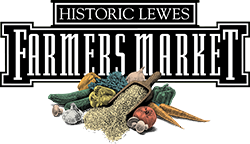A Few Words About Sustainable Agriculture
Farmers markets are an ancient method used by farmers worldwide to sell their produce directly to the consumer. As food production in the U.S. became increasingly industrialized, many farmers markets were replaced by brokers and supermarkets.
Fortunately, there is now a burgeoning movement to bring farmers markets back, and we in Lewes are proud to be a part of that worldwide effort. The farmers participating in our market practice sustainable agriculture farming that produces abundant food without depleting the earth resources or polluting its environment.
This type of agriculture supports vibrant rural communities and produces wholesome food for everyone. Sustainable practices lend themselves to smaller, family-sized farms. These smaller farms are most successful within local food systems, selling at least part of what is grown directly to consumers at farmers markets. It is our hope that the Historic Lewes Farmers Market helps reconnect people with one another, the land, and the source of our food.
Community Connections
There are many websites about Sustainable Agriculture, the Slow Food Movement, and the Greening of America. Here are a few of our favorites.
- American Farmland Trust
- Center for Inland Bays
- Chesapeake Bay Foundation
- Environmental Working Group
- Future Harvest - Chesapeake Alliance for Sustainable Agriculture
- Local Harvest
- National Center for Appropriate Technology
- National Sustainable Agriculture Information Service (ATTRA)
- National Young Farmers Coalition
- Pasa Sustainable Agriculture
- SlowFood USA
- USDA National Organic Program
